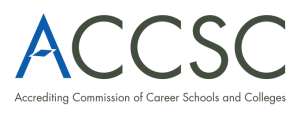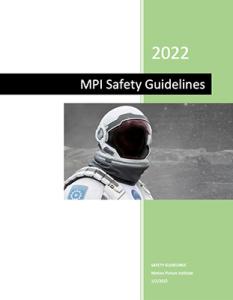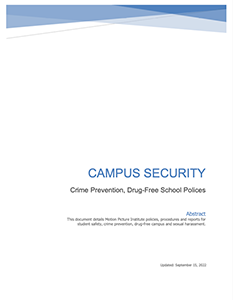Consumer Information
ACCREDITATION
Motion Picture Institute is a for profit proprietary school offering a certificate program in filmmaking.
 The Accrediting Commission of Career Schools and Colleges (ACCSC) accredits the school and program.
The Accrediting Commission of Career Schools and Colleges (ACCSC) accredits the school and program.
The U.S. Secretary of Education has continuously recognized ACCSC as an independent, nonprofit accrediting agency since 1967. The Commission enforces strict standards and practices, which contribute to the development of a highly trained and competitive workforce through accredited institutions. Their mission is to serve as a reliable authority on educational quality and to promote enhanced opportunities for students.
Motion Picture Institute is licensed by the Michigan Department of Licensing and Economic Opportunity, Lansing, Michigan.
Students wishing to inspect or review Motion Picture Institute’s accreditation, department of education or state approvals may request to do so by emailing admin@motionpicture.edu. Students will be offered to review school approvals by scheduling an appointment on campus with a school administrator who will present documentation.
THE MOTION PICTURE PRODUCTION PROGRAM OUTCOMES
The following statistic reflects the status of available graduates from 2 Motion Picture Production classes that started between October 2020 through September 2021, as of October 2023 (as reported to ACCSC in our Annual Report for 2023).
GRADUATION RATES:
Total Number of Students Started………………………………………..45
Total Number of Students Available for Graduation………….….45
Total Number of Students Completed…………………………………..40
Completion Rate: 89%
Completion percentage is determined by dividing the number of students who completed the respective program by the number of students available for graduation for that program. Unavailable students are those who are determined to fit one or more of the following categories:
- Student is in active military deployment
- Student has a medical condition that prevents continued enrollment
- Student is incarcerated
- Student is deceased
EMPLOYMENT RATES:
Total Number of Students Graduated………………………………….. 40
Total Number of Grads Available for Placement…………………….35
Total Number of Grads working in the field……………………………25
Employment Rate: 71%
Placement percentage is determined by dividing the number of graduates who are employed in the field for which they were trained by the number of graduates available for job placement. Unavailable graduates are those who determined to fit one or more of the following categories:
- Student is continuing his/her education
- Student is in active military deployment
- Student has medical restrictions
- Student is incarcerated
- Student is deceased
LICENSURE AND CERTIFICATION
In the dynamic world of motion pictures, it’s worth noting that specific licensure or certification isn’t a requirement to break into the industry. The Motion Picture Institute, with its impressive 25+ year history, has consistently found that what truly matters are solid skills and the ability to put them to effective use. These qualities not only assure success but also enhance your prospects in the exciting world of filmmaking. The Motion Picture Production Program takes pride in providing the necessary skillset to succeed in the industry.
ADDITIONAL GAINFUL EMPLOYMENT DISCLOSURES
This program will cost $18,439.00 (includes books and supplies – see Tuition page) if completed within the normal time (2021-22 Sept Start). There may be additional costs for living expenses. These costs were accurate at the time of posting, but may have changed.
For more information about graduation rates, loan repayment rates, and post enrollment earnings about this institution and other post secondary institutions please click here: https://collegescorecard.ed.gov/
PROGRAM TUITION INFORMATION
Tuition costs, fees and additional expenses can be accessed here.
COVID SAFETY GUIDE
The MPI Covid safety guide for on-site attendance is enumerated in the guidebook.
MPI Family Educational Rights and Privacy Act (FERPA)
Motion Picture Institute has adopted the following policies and procedures in accordance with the Family Educational Rights and Privacy Act of 1975, 20 U.S.C. Section 1232(g) (as amended). FERPA rights commence when students begin their first course at Motion Picture Institute. Motion Picture Institute will not release information to parents or other individuals regarding a student’s academic record unless this privacy is waived in writing by the student. The student can change his/her mind at any time by informing Motion Picture Institute’s Director of Enrollment in writing.
Rights under FERPA
The Family Educational Rights and Privacy Act (FERPA) affords students certain rights with respect to their education records. These rights include:
1. The right to inspect and review his or her education records within 45 days of the day Motion Picture Institute receives a request for access. Students should submit to the Director of Education written requests that identify the record(s) they wish to inspect. The Director of Education will make arrangements for access and notify the student of the time and place where the records may be inspected. If the particular records are not maintained by the Director of Education, the Director shall advise the student of the correct individual at Motion Picture Institute to whom the request should be addressed.
2. The right to request an amendment of any of the student’s education records that he or she believes are inaccurate or misleading. When requesting an amendment, the student should write the Director of Education, clearly identifying the part of the record they want changed and specifying why it is inaccurate or misleading. If Motion Picture Institute decides not to amend the record as requested by the student, Motion Picture Institute will notify the student of the decision and advise the student of his or her right to a hearing regarding the request for amendment. Students may submit a statement to be kept and disclosed with the record if Motion Picture Institute still decides not to amend the record after the hearing. Additional information regarding the procedures will be provided to the student when he or she is notified of the right to a hearing.
3. The right to consent to disclosures of personally identifiable information contained in the student’s education records, except to the extent that FERPA authorizes disclosure without consent. One exception that permits disclosure without consent is disclosure to school officials with legitimate educational interest. A school official is a person employed by Motion Picture Institute in an administrative, supervisory, academic, research, or support staff position (including law enforcement unit personnel and health staff); a person or company with whom Motion Picture Institute has contracted (e.g., an attorney, auditor, or collection agent); a person serving on the Board; or a student serving on an official committee (e.g., a disciplinary or grievance committee) or assisting another school official in performing his or her tasks. A school official has a legitimate educational interest if the official needs to review an education record in order to fulfill his or her professional responsibility. Upon request, Motion Picture Institute discloses education records without consent to officials of another school in which a student seeks admission or intends to enroll.
Records may be released by the school to auditors for annual audit purposes, accreditation agencies, and state and federal oversight agencies, including the Veteran’s Administration, the Office of Student Financial Aid, the State Licensing Board, and other agencies that may legitimately request insight into the school’s operations. Records may also be released to the banks or other lenders having provided loans for payment of tuition or living expenses. The school keeps a record of such access by the third parties.
You, as a student, are also herein advised of the right to file a complaint with the US Department of Education concerning alleged failures by Motion Picture Institute to comply with the requirements of FERPA. The complaint must be filed within 180 days of the date you learned the circumstance of the alleged violation.
Any timely complaints from a parent or eligible student alleging violations of the provisions of FERPA may be submitted in writing to: Family Policy Compliance Office, US Department of Education, 400 Maryland Ave. SW, Washington, DC 20202-4605.
CAMPUS SECURITY AND CRIME PREVENTION
The Jeanne Clery Disclosure of Campus Security Policy and Campus Crime Statistics Act, more commonly known as the Clery Act, is contained (along with other security-related disclosure requirements) in section 485 of the Higher Education Act, codified at 20 U.S.C. § 1092. It requires all postsecondary education institutions to keep records and report annually on the nature, date, time, and place of crimes occurring on campus, including hate crimes. It also prescribes a number of security related protocols for emergency response procedures, timely notifications for on-campus crimes, etc.
For your information, a copy of Motion Picture Institute’s Annual Campus Safety and Security Report (also known as our Annual Security Report, or ASR) is available on the school website. This report is distributed in compliance with the Clery Act. Also included is a copy of information relating to Motion Picture Institute’s Drug and Alcohol Abuse Prevention Programs. Click on the image of the Campus Security and Crime Prevention Report on the left, updated September 15, 2022, to view the entire document.
Motion Picture Institute’s commitment to safety and security includes:
• Providing a secure and crime free environment for students, faculty and staff.
• Performing regular evaluation of security programs.
• Monitoring and following up on each crime reported at a Motion Picture Institute location.
We believe student, faculty, and staff behavior which promotes security awareness is important in all aspects of our lives and we encourage all students, faculty and staff to accept responsibility for their own security as well as the security of other members of the Motion Picture Institute community.
COPYRIGHTED MATERIAL POLICY
MPI either condones nor supports the use of peer-to-peer file sharing or copyrighted material in ways in which the material was not intended. Students who violate Federal copyright laws may be subject to penalties such as paying court ordered compensation, monetary fines and/or jail sentencing. A student’s enrollment at MPI may be terminated if he or she is found to be file sharing, uploading, downloading, or distributing copyrighted material, in any form without permission or consent from the copyright holder.
Students are responsible for complying with copyright laws and MPI’s policy and procedures for computer use. The Digital Millennium Copyright Act (DMCA) of 1998 amends the federal copyright law to provide certain liability protections for online service providers when their computer systems or networks carry material that violate (infringe) copyright law. The Digital Millennium Copyright Act specifies that all infringement claims must be in writing (either electronic mail or paper letter). Student’s should not download, upload, transmit, make available, or otherwise distribute copyrighted material without authorization using the institute’s computer systems, networks, Internet access or storage media. Contact a Student Advisor or see the student handbook for details on making an infringement claim.
Copyright infringement is the act of exercising, without permission or legal authority, one or more of the exclusive rights granted to the copyright owner under section 106 of the Copyright Act (Title 17 of the United States Code). These rights include the right to reproduce or distribute a copyrighted work. In the file-sharing context, downloading or uploading substantial parts of a copyrighted work without authority constitutes an infringement.
Penalties for copyright infringement include civil and criminal penalties. In general, anyone found liable for civil copyright infringement may be ordered to pay either actual damages or “statutory” damages affixed at not less than $750 and not more than $30,000 per work infringed. For “willful” infringement, a court may award up to $150,000 per work infringed. A court can, in its discretion, also assess costs and attorneys’ fees. For details, see Title 17, United States Code, Sections 504, 505.
Willful copyright infringement can also result in criminal penalties, including imprisonment of up to five years and fines of up to $250,000 per offense. For more information, please see the website of the U.S. Copyright Office at www.copyright.gov.
CONSTITUTION DAY
Motion Picture Institute celebrates Constitution Day each September with a special event, activity or educational offering related to our nation’s founding document. This year, September 17, 2020 will offer students a special screening of A More Perfect Union at 9 am EST at the school for graduating students. RSVP for Covid-19 regulations.
STUDENT COMPLAINT PROCEDURES
Schools accredited by the Accrediting Commission of Career Schools and Colleges must have a procedure and operational plan for handling student complaints. If a student does not feel that the school has adequately addressed a complaint or concern, the student may consider contacting the Accrediting Commission. All complaints reviewed by the Commission must be in written form and should grant permission for the Commission to forward a copy of the complaint to the school for a response. This can be accomplished by filing the ACCSC Complaint Form. The complainant(s) will be kept informed as to the status of the complaint as well as the final resolution by the Commission. Please direct all inquiries to:
Accrediting Commission of Career Schools & Colleges 2101 Wilson Boulevard, Suite 302 Arlington, VA 22201
(703) 247-4212
www.accsc.org | complaints@accsc.org
A copy of the ACCSC Complaint Form is available at the school and may be obtained by contacting complaints@accsc.org or at https://www.accsc.org/Student-Corner/Complaints.aspx.
COMPLAINTS TO THE STATE
Should a student determine that the MPI grievance policy has not been applied, stated student may contact the Michigan Department of Attorney General, Consumer Protection Division at (517) 373-1140 or file a complaint form at: https://www.michigan.gov/leo/0,5863,7-336-94422_95539_2739—,00.html
PHYSICAL DISABILITIES & REASONABLE ACCOMMODATION POLICY
Students with a learning difference or physical disability that may impact their class and/or academic performance must meet with the admissions office prior to enrollment so that any necessary and reasonable arrangements can be made. Such students will meet with an advisor at the beginning of the program to arrange an appropriate plan to facilitate any special needs or requirements.
Motion Picture Institute facilities are wheelchair accessible, including restrooms. Motion Picture Institute cannot accommodate an individual who does not inform school officials about his or her disability and his or her need for an accommodation. If a student believes that an accommodation is needed, the request for an accommodation may be made at any time during their enrollment. However, a request for accommodation must be made prior to the coursework to which it applies.



